When she learned about the new Fordham College Advising Center, then, she was enthusiastic. Her response? “‘This is the best thing you guys can do,’” she said.
The center has drawn funding support from several donors including Smolens since it was formally launched in fall 2022 to revamp student advising at Fordham College at Lincoln Center and Fordham College at Rose Hill.
The center provides more personalized, holistic support from professional advisers who help students complete paperwork, navigate the University, connect with services including mental health counseling, and formulate career plans—allowing faculty members to focus their energies on academic mentoring and students’ professional development.
This new system appeals to Smolens because of how it will help alleviate the anxieties of college life and bolster students’ well-being. “Having someone that’s professionally trained to help students, to deal with students, I think is very, very important,” said Smolens, a retired private equity advisor and investor and member of the Fordham University Board of Trustees. “I am 1000% behind this advising center, and I will give to it every year.”
In light of her experiences as a student, businesswoman, and parent, she has a passion for student advising and the related topic of developing one’s career—as well as the particular challenges facing women.
Tell me about someone at Fordham who made a difference for you.
My senior year, I was taking a class with William T. Hogan, S.J., “the steel priest,” who was running the Industrial Economics Research Institute. He asked me to stay at Fordham for graduate school in economics and be his graduate assistant, and that really was what made my career. I got to be on the phone with CEOs of steel companies with him, and it gave me this whole business perspective that I lacked.
What is some career advice you commonly give to students?
I’ve told my sons and their friends that sometimes your first job may not be your ideal job, but you have to look at it as a steppingstone and ask, is this going to help me do something else? In many ways, there’s no bad experience. Sometimes you don’t even know you’re getting good experience until something happens down the line and you’re like, “Oh, yeah, I know how to deal with this.”
Through your past involvement with Fordham’s Women’s Summit, you’ve helped to highlight the challenges facing women in the workplace. Do you see progress?
I was starting to see it improve, but I’m not sure it’s improving anymore. I still think there’s a different mindset for men and women. Women can advance, but you still have to work harder. I think [the Women’s Summit]is a phenomenal thing that we do at Fordham—in today’s times, for young women to see and hear the stories of successful women is really, really important.
To what extent has the #MeToo movement succeeded?
I’ve always told [people], you just have to be careful. If you give out that persona that you’re not going to take anybody’s nonsense, I think that really helps. Students have called me, asked me for my experiences, and I have talked to them, talked them through things, and I would continue to do that when asked.
How was your Fordham education uniquely valuable to you?
In my career in finance, I’ve seen some very unethical behavior. My parents taught me proper ethics, but Fordham really reinforced it. One of the biggest things you can get out of Fordham education is becoming a truly ethical person in the way you conduct your life, in business and personally.
Gifts toward the Fordham College Advising Center support student wellness and success, one of the pillars of Fordham’s $350 million fundraising campaign, Cura Personalis | For Every Fordham Student. Learn more and make a gift.
]]>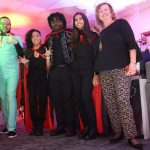
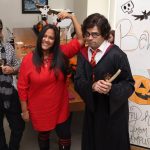
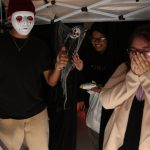
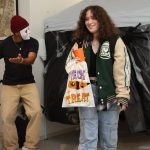
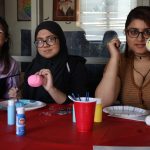
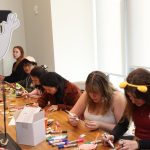


It was a new ambience for the Joseph M. McShane, S.J. Campus Center: eerie music, wolf howls, ghoulish costumes, giant cobwebs, a hallway-size haunted house, laughter mixed with the occasional frightful yelp.
The one flaw in the spookiness? All that natural light flooding in through the huge windows. “The sun is always shining in, it’s beautiful,” said Gabriel Chavarria, a Fordham College at Rose Hill senior passing through the Career Center and Campus Ministry areas.
The Haunted Open House marked a new effort to help fully integrate the McShane Center into University life by enticing students to wander the full length of the second floor, discovering the cavernous hallways and hangout areas along the way—as well as all the offices there to serve them.
The second floor’s Halloween-season transformation highlighted a much larger, permanent transformation of student life brought about by the campus center’s construction, a pillar of the University’s $350 million fundraising campaign, Cura Personalis | For Every Fordham Student.
Enhancing the Entire Student Experience
Construction on the campus center has continued since it opened to students last year. Amid the second-floor Halloween hijinks on Oct. 17, crews were working on the first-floor Marketplace renovation that will produce a vastly better dining experience in another nine months or so.
Unfinished as it is, the McShane Center already feels like students’ home. “This is such a huge resource, and I think it’s a real asset to the University,” said Isabella Guariniello, a junior at Fordham College at Rose Hill who found the haunted house to be “a really cool way to interact with the students and the faculty here.”
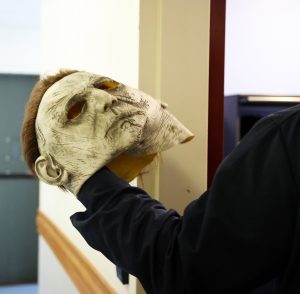
Commuter student Ryan Nole, a Gabelli School of Business junior, appreciates being able to hang out in the campus center between classes. He’s noticed that it’s brought new visibility to student clubs and organizations and provides a kind of social lubricant—“I know if I want to see someone, they’ll probably be here,” he said while checking out the open house. “It definitely fulfills its role as a community space.”
In fact, with so many students gravitating toward the new student lounge and communal spaces on the first floor, “we wanted another way for students to kind of say, ‘Hey, there’s more parts to the building, there’s a whole bunch of stuff up here,’” said Juan Carlos Matos, assistant vice president for student affairs for diversity and inclusion—dressed up for the occasion as “Dr. Acula.”
Students partook of Halloween candy—including the allergy-free kind—and activities like pumpkin painting. All of the second-floor offices got into the act, including Student Services, the Office for Student Involvement, and the Office of Multicultural Affairs.
‘Cathedral-Like’ Light
To be sure, the new campus center has already been boosting the work of second-floor offices including the Career Center, which gained a new suite equipped with 10 interview rooms, event space, and other amenities, including new capabilities to promote career-related events.
The new suite “has truly elevated our office University-wide,” said Annette McLaughlin, director of the Career Center. The 840 career counseling appointments held from July through September represent a 24 percent increase over the same period last year, she noted.
Campus Ministry and the Center for Community Engaged Learning, or CCEL, now share a roomy, inviting suite with floor-to-ceiling windows providing “cathedral-like” light, in the words of Campus Ministry administrator Carol Gibney. It offers plenty of room for students to study or hang out and unwind, making it more likely that they’ll learn about something they want to get involved in, said Amanda Caputo, FCRH ’23, a program manager with Global Outreach. “Students [have]made this their home, in a way,” she said.
By providing generous, dedicated space for CCEL’s meetings with its New York City partner organizations, the facility “demonstrates the University’s commitment to community engagement and experiential learning,” said the center’s executive director, Julie Gafney, Ph.D.
“It helps to show that this is what we mean when we say we’re a Catholic and Jesuit institution,” she said. “We mean that we create spaces that put our mission work first.”
Learn more about the McShane Campus Center renewal and opportunities to give in support of it.
]]>That’s just the kind of fund Sgt. Joseph Collins would have wanted to support, according to his sister.
Margaret Collins, M.D., TMC ’72, recently supported the fund by donating $25,000 from a life insurance annuity that Joseph left behind when he died in 2001. Recalling what he and their brother, John, went through after serving in the Vietnam War, she said today’s veterans “shouldn’t be burdened with not having what the government promises to give them. That’s just not right.”
Still, it happens with some regularity, said Matthew Butler, PCS ’17, senior director of military and veterans’ services at Fordham.
Student Vets on Tight Budgets
The government’s Post-9/11 G.I. Bill payments can be delayed or scheduled to arrive after the bills are due, causing headaches for student veterans who often have “very little margin of error” financially and have to make difficult choices as a result, Butler said.
“We’ve seen a few students that have made those decisions between getting a MetroCard or putting food on their table for the family,” he said.
The emergency fund offers student vets microloans or emergency grants. It’s one fundraising effort launched last year as part of the yearlong celebration of 175 years of military training at Fordham. The fund dovetails with the student wellness and success priority of the University’s $350 million fundraising campaign, Cura Personalis | For Every Fordham Student.
Collins said her brother would have been pleased to help veterans, including those “who are trying to complete a college education and to begin a second career, and who can add so much, and do add so much, to our society.” She is also funding a scholarship for student veterans in Joseph’s name.
Lives of Service
Joe Collins served with “Dustoff” helicopter crews that evacuated the wounded from combat zones, and his brother, Capt. John Collins, M.D., FCRH ’55, served as an Army surgeon and head of a surgical research team.
Both suffered post-traumatic stress, Joe to a greater extent, and came away from the war anguished at how it was being conducted, said Collins, a pediatric pathologist at Cincinnati Children’s Hospital Medical Center.
The siblings grew up in the Bronx. Joe graduated from Fordham Preparatory School and briefly attended Fordham University before he was drafted into the Army. He later earned his bachelor’s and master’s degrees from Lehman College after retiring from the Army around 1990 and worked as a teacher in Brooklyn and in San Francisco.
During his time in Vietnam, John Collins, who died in 1992, made discoveries that improved treatment of wounded soldiers—finding that the practice of adding bicarbonate to banked blood supplies could be harmful, and also showing the need to address respiratory distress, or “shock lung,” when treating traumatic injuries.
In separate conversations with her, Collins said, her brothers each hailed the other’s courage: John praised Joe for traveling in helicopters that landed in combat zones, and Joe commended John for riding with ambulance crews to reach wounded soldiers sooner, even though the ambulances were “sitting ducks” in the exposed plains around Saigon.
Hearing them talk, “I decided that a hero is the guy who always sees that somebody else did more,” she said. “Somebody else had more danger. Somebody else really braved it.”
Learn more here about Fordham’s services and supports for student veterans and military-connected students.
To inquire about giving in support of student veterans at Fordham, please contact Patrick Russell, director of development, at [email protected]. Learn more about Cura Personalis | For Every Fordham Student and make a gift.
]]>It didn’t take him long to get involved with the Foundry. He had shown an entrepreneurial bent in his own career, bootstrapping his way into new types of roles on his way to becoming executive vice president and chief financial officer at Adobe. Since retiring from the company in 2021, he has been helping various businesses and nonprofits grow by serving on their boards.
And now he’s helping Fordham students and alumni develop their business ideas as an advisory board member for the Foundry. Between its advisory board, alumni council, partner organizations, and student entrepreneurs, the Foundry offers a wide and diverse community that, Murphy said, is “critically important” for budding entrepreneurs.
“They can access mentors, collaborators, investors, customers, partners, and many others that will aid their journey in creating a viable business,” he said. “I just want to see [the Foundry]continue to grow and offer more opportunities for students.”
To that end, he has been a major donor to the Foundry’s 10th anniversary fundraising campaign, an effort to raise $1.5 million in support of expanded programming and resources for student and alumni entrepreneurs.
Murphy is an advocate for teaching the entrepreneurial mindset broadly, not just to those founding businesses. Entrepreneurial qualities, he said, include resilience, confidence, drive, and the ability to learn from failure—all of which play into students’ wellness and success, a pillar of the University’s $350 million fundraising campaign, Cura Personalis | For Every Fordham Student, for which Murphy is a cabinet member.
How would you describe the entrepreneurial mindset?
Entrepreneurship education has evolved greatly over the past 15 to 20 years, incorporating a lot of soft skills, communication skills, and ways to be resilient. Resiliency is not only about “keep trying, keep trying”—no, you need to ask, why didn’t you succeed? What was it you missed? It really is about combining life experiences, work experiences, and trials and failures with everything you learn academically, and being able to look around corners to identify opportunities that aren’t obvious.
What does entrepreneurial thinking look like at the executive level?
Continuous learning. I’ve worked for a number of CEOs, and the best ones didn’t sit back and say, “I became CEO, so now I know everything.” The last CEO I worked for, Shantanu Narayen, of Adobe, regularly met with a network of fellow CEOs to talk about the challenges they were having, and it really framed how he operated the business strategically. Someone once told me, “Build a network of mentors and advisors around you that augment your skill gaps. Let them be your personal board of directors, essentially.” You’ll get candid feedback and ideas for new actions to take.
How does your own career show that approach?
Earlier in my career I got into mergers and acquisitions, which wasn’t typical of someone like me, who started out a certified public accountant. But I was interested in what makes one business a good fit with another, so I volunteered to participate in some projects. I just realized there’s no harm in trying. I was able to surround myself with people that filled in my own skill gaps so I could learn from them. And that skill set became critical when I was at Adobe—we ended up acquiring several businesses that were key to the company’s growth. In fact, Photoshop was originally an acquisition, which is kind of funny, because now, almost 30 years later, it has become iconic to the Adobe brand.
What do you enjoy most about being involved with the Foundry?
I love spending time with the alumni and the students, helping them think about potential obstacles and how to overcome them. It’s been really fun—while I didn’t start my own business, I get excited about someone else wanting to, and I can impart things that I’ve learned. Also, the Foundry has this social entrepreneurship mindset, emphasizing the idea that it’s not just about your success, it’s about what your business can do for the community around you. I think that’s a key component of the Foundry’s mission that really blends well with the University’s overall Cura Personalis campaign. And I love that.
Learn more about the Fordham Foundry and give in support of its campaign.
]]>“I was immediately interested in the internship because it combined my passions for content creation, marketing, and helping youth,” said Gonzalez, a senior at Fordham College at Rose Hill.
Gonzalez got the position through Serving the City, a paid internship program available only to students enrolled at Fordham College at Rose Hill and Fordham College at Lincoln Center.
Early Roots
The program began in 2020 with two partner organizations, the Museum of Art and Design and the New York Historical Society, under the title Cultural Engagement Internship Program. The goal of the program was twofold—students would gain experience and receive a stipend from Fordham, and nonprofit partner organizations would benefit from the support of an intern.
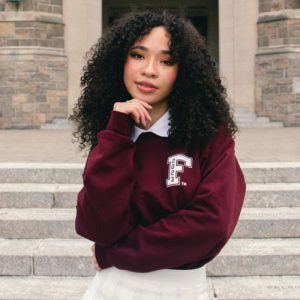
Though the program began with nonprofit institutions focused on arts and culture in New York City, it quickly grew to include other types of nonprofits serving the city’s communities. More than 60 students have interned with more than 35 organizations since it launched.
“Over the past year, we’ve really built out our partnerships,” said Desirae Colvin, director of administration, communication, and strategic initiatives in the Fordham College at Lincoln Center Dean’s Office, who manages the program at Lincoln Center and at Fordham College at Rose Hill. “After a certain point, we thought cultural engagement as the moniker doesn’t feel as reflective of that. We started to think, ‘What do they have in common?’”
That’s how the name Serving the City was born, Colvin said, to include the range and depth of internship opportunities and partner organizations.
Supporting Nonprofits Throughout the City
Arika Ahamed, a junior majoring in neuroscience at Fordham College at Lincoln Center, was one of the first to intern with a group outside of the arts and cultural organizations. She interned in summer 2021 with the Elmhurst Corona Recovery Collaborative in Queens—a group of about 25 nonprofit organizations that provided assistance and resources to residents impacted by the pandemic.

Ahamed helped create a pamphlet of resources, maintained and updated the collective’s website, and helped coordinate meetings across the coalition to keep members on track. One of her main goals was to help make the information accessible to those in need.
“One of the biggest things we noticed was that [the website]was all in English, which was something that we needed to work on,” she said. “So I was able to figure out a way to easily translate the entire website without having a translator, by connecting it to Google Translate.”
Ahamed said the internship gave her new skills in organization and communication.
“The biggest thing I think I learned from this was professionalism in general—I had to send out emails to over 75 people and at first, it was daunting because it wasn’t something I’ve ever done before,” she said.
Despite the expansion, the program still includes several cultural partners. When the pandemic forced the Chelsea Music Festival to move its events to a virtual setting, the organization needed help promoting its work, getting media coverage, and connecting with audience members. Enter Samantha Matthews, now a senior at Fordham College at Lincoln Center.
Matthews was the public relations and marketing intern during 2021, responsible for reaching out to media organizations for coverage and promotion as well as running the social media accounts.
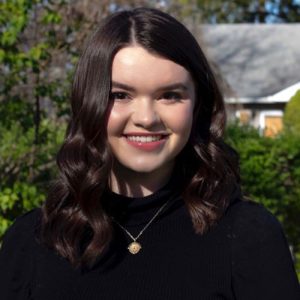
“I enjoyed their mission of giving back,” Matthews said of the festival, which aims to “give emerging voices, particularly those of women and people of color, a stage” and support a community of musicians, composers, and artists. “At Fordham, our motto is to be men and women for others and philanthropy is a cornerstone of our education, so that’s something that’s important to me,” she said. “The fact that [the internship]also tied in music and it tied in art, was really appealing to me.”
Matthews said that the internship helped her realize that public relations is something she wants to pursue, which led her to her next two internships at Les Coeurs Sauvages, an ethical fashion brand, and Head & Heart PR. She also said that she’s grateful for the connections she made.
“I really enjoyed what I did, and the environment there,” she said. “I know what I want to do in life now, and I also have met people that I know that I could call if I ever need help.”
Equitable Opportunities for Students
One of the biggest benefits of the program, according to students, is that it provides paid internships, making it accessible to those from a variety of backgrounds. This was essential right from the start, according to Fordham College at Rose Hill Dean Maura Mast, who described the need for equity at a Homecoming panel in 2021.
“Fordham students, while they have a lot of internship opportunities in the city, they’re often unpaid,” said Mast. “Often students have to decide between taking an internship for credit and getting paid. We want our students to have access to these opportunities [no matter their financial situation].”
The Serving the City program began the year before Fordham publicly launched its $350 million fundraising campaign, Cura Personalis | For Every Fordham Student, which seeks funding for this and other programs that help students discern their paths and form new career-building connections.
Serving the City “would not exist without the generosity of alumni and donors,” said Laura Auricchio, Ph.D., dean of Fordham College at Lincoln Center. “It is 100% funded by individual contributions, and those contributions go directly and exclusively to student stipends.”
Donors to the program “double or triple their impact,” she said, by giving students a more educational alternative to minimum wage jobs, enabling nonprofits to augment their staffs with Fordham students, and helping the nonprofits advance their missions.
“The financial support for the internships is one of the linchpins of the program,” Colvin said. “It’s integral to what the program is for—ensuring that students can opt for something that they find meaningful and that they can be financially supported. Too often a choice of one or the other is made.”
Colvin said that since the program is run by existing staff in the dean’s offices, all donations go directly to supporting student internships without having to fund any overhead costs.
“This is truly you’re supporting this student to be able to do this internship,” she said. The program has a fund where donations can be made directly.
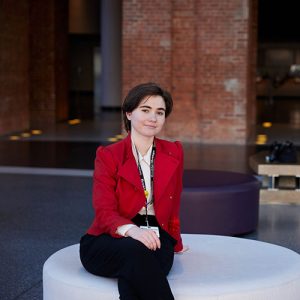
Caridad Kinsella, a senior at Fordham College at Lincoln Center, said that being paid for their internship at the Brooklyn Museum was a “top three reason” why they applied in the first place.
“I live in the city, I pay for college myself, I had a second job—so the fact that these internships exist and that they are paid, and that students are paid a fair wage for their work, that is hugely important,” Kinsella said.
Kinsella worked with the visitor experience and engagement department at the museum, specifically conducting background research for the exhibit on fashion visionary Thierry Mugler exhibit. Mugler, who The New York Times described as a “genre-busting” designer, was gay and embraced LGBTQ+ representation in many of his shows, even at times when it wasn’t popular.
“I enjoyed getting to do a lot of the research and writing [for the exhibit],” they said. “I’m a huge fan of fashion, and I like history, and I’m also queer—this work connects a lot of those things.”
A Launching Pad for Future Success
Kinsella said that one of the great things about the Brooklyn Museum was that it has a mentorship program that’s helping them navigate the transition from college to a full-time career. Kinsella’s mentor from the museum is helping them with reviewing their resume and cover letters and practicing for interviews.
Kassandra Ibrahim, a 2022 graduate from Fordham College at Rose Hill who is now pursuing her master’s at Sotheby’s Institute of Art, also interned at the Brooklyn Museum. Ibrahim used her experience working on the Andy Warhol exhibit to help get her next internship, working at the Met. Both internships informed her senior thesis project, which combined her interest in art history and theology.
“I think that this internship taught me that there isn’t really a hard line between art history and other disciplines,” Ibrahim said. “And it inspired me to come up with my senior seminar topic. I’m working on representations of early Christian women, and I thought of that topic while I was in the museum one day, because I thought, ‘Wait, I don’t have to choose one or the other.’”
Kinsella said that the internship opportunity gave them both hard and soft skills.
“There’s the practical connections and networking skills that you pick up, but there’s also the softer side of gaining the confidence to use those skills,” they said. “For me, it’s been a transformative experience, not only to connect to where I live in New York City, but also to the Fordham community.”
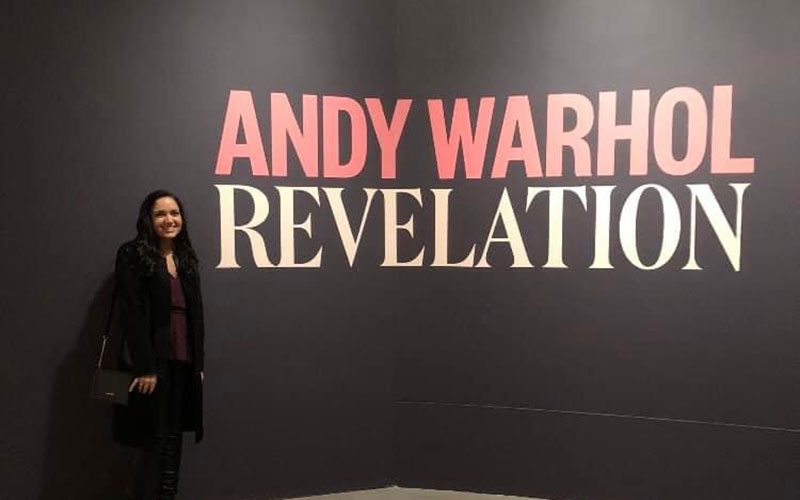
To inquire about giving in support of the Serving the City program or another area of the University, please contact Michael Boyd, senior associate vice president for development and university relations, at 212-636-6525 or [email protected]. Learn more about Cura Personalis | For Every Fordham Student, a campaign to reinvest in every aspect of the Fordham student experience.
]]>Tradition holds that Fordham’s military heritage dates from 1848, when the state of New York issued Fordham 12 muskets for defense against the threat of nativist rioters, noted Lt. Col. Paul Tanghe, Ph.D., professor of military science at Fordham, at the Nov. 6 event at the Rose Hill campus. Today, the University is home to a military service community comprising “one of the most diverse [ROTC] cadet battalions in the Northeast” and more than 400 students who are veterans, he said, noting the University’s reputation for being welcoming to them.
“The military-connected community is one of the things that makes Fordham special,” he said. “This is a community that’s built around individual paths of service coming together in one place.”
Efforts to honor, support, and grow that community will be part of the yearlong anniversary celebration.
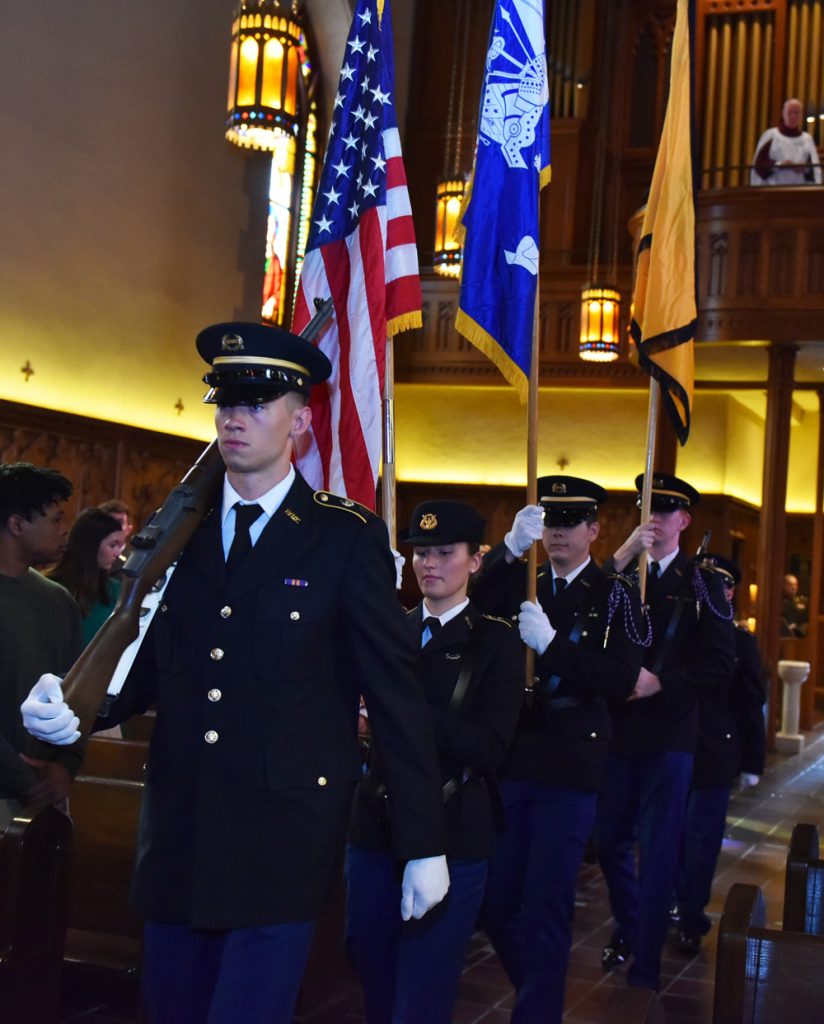
The Office of Military and Veterans’ Services and the Department of Military Science will host two events per month from January through November, with each month’s events organized around a chapter of military history at Fordham. January’s events include a service project—in partnership with Campus Ministry—related to welcoming immigrants, harking back to the origins of Fordham’s military training in 1848. Events in later months will commemorate the Civil War, Vietnam War, World War I, and other epochs, culminating in a gala to be held in November 2023.
There is also a “military muster” outreach effort to Fordham’s military community—ROTC graduates, student and alumni veterans, faculty and staff who served, and friends and family of Fordham veterans—to reengage them with the University. In addition, the veterans’ services office will lead an effort to raise $4.2 million to support ROTC cadets and student veterans as part of Cura Personalis | For Every Fordham Student, the University’s $350 million fundraising campaign.
The veterans’ services campaign received some impromptu support at the Nov. 6 event, which celebrated two distinguished alumni veterans as well as the ROTC program and student-veteran community at Fordham.
Two Who Served with Valor
Attendees included alumni, student veterans, and cadets in Fordham’s ROTC program, a flagship program in the Northeast comprising cadets who attend 17 New York-area schools, from New York University to the Parsons School of Design, Tanghe said.
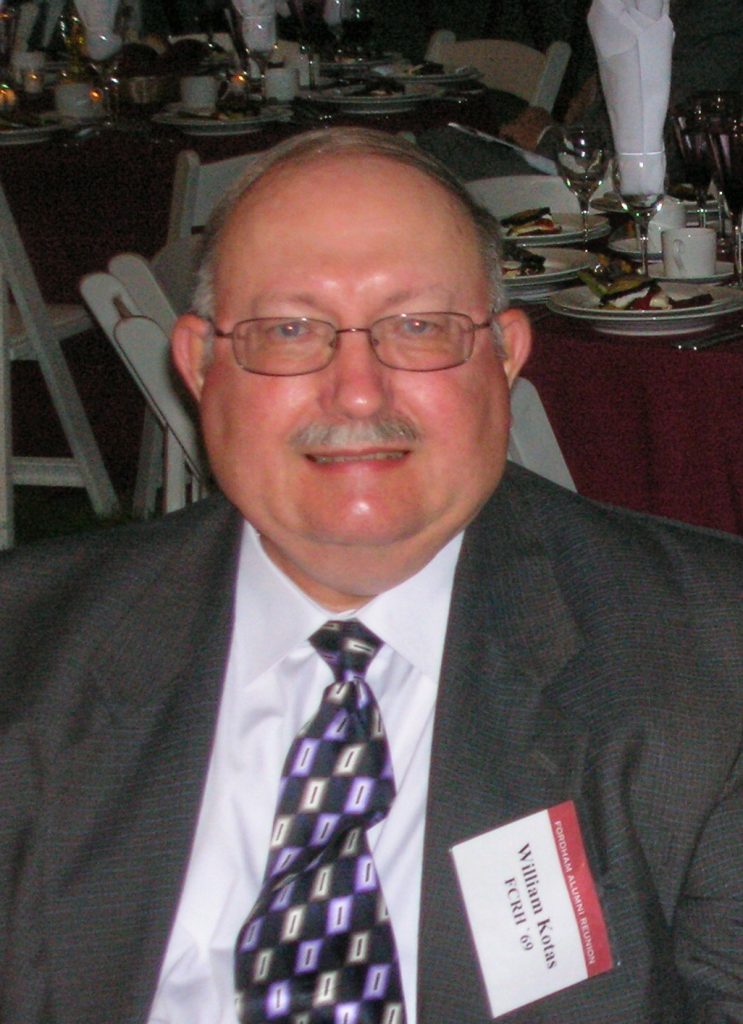
Two alumni veterans were inducted into the Fordham University Military Hall of Fame: William E. Kotas, FCRH ’69, a graduate of Fordham’s ROTC program, onetime U.S. Army captain, and Vietnam War veteran, who was honored posthumously; and retired U.S. Marine Corps Capt. Gerry Byrne, FCRH ’66, a Vietnam War veteran, media executive, community leader, and entrepreneur.
Kotas, who died last year, served as a platoon leader with the 23rd Infantry Division. He was inducted in honor of “the way that he approached all of his duties and obligations to others in his life,” from his cadet years to his post-Army life, Tanghe said.
“His military service was shorter than he wanted it to be because of the manner in which he approached it”—that is, with devotion to the soldiers under his command, Tanghe said.
In a display of that devotion, he personally led a patrol during which he suffered grievous injuries that would require a year of hospitalization and medical retirement from the Army. At the time of his injury, he continued to lead his men and directed them to safety. Kotas received multiple military honors, including the National Defense Service Medal, the Parachute Badge, and the Bronze Star Medal with the “V” device to denote heroism.
Moving back to Nashville, Tennessee, “he continued to find a life of purpose and meaning,” Tanghe said. Kotas was a founding member of the St. Ignatius of Antioch Catholic Church in Nashville and taught in its adult education program on Sundays, among other community activities, and worked for the U.S. Postal Service until his retirement.
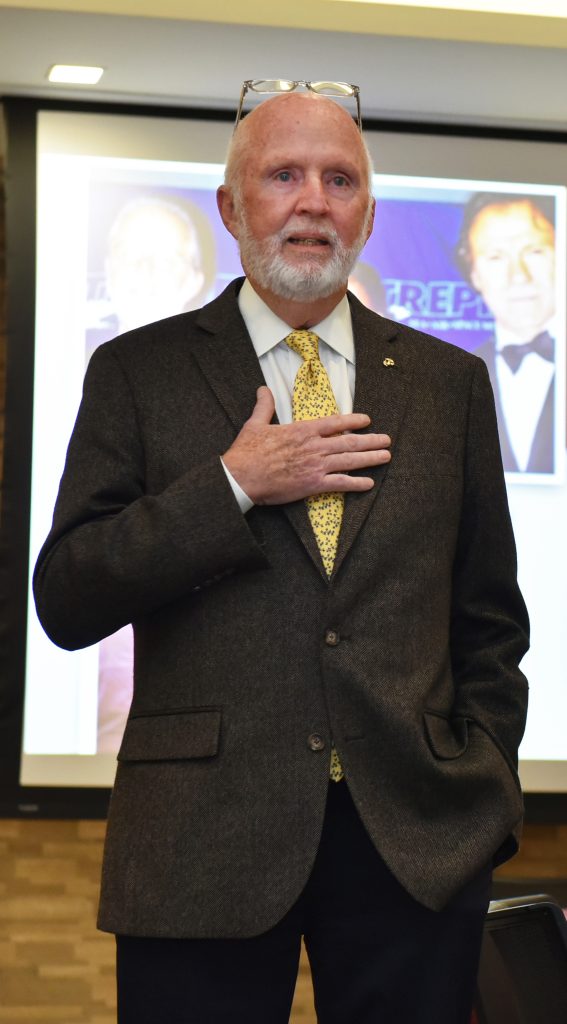
Byrne, a 1962 graduate of Fordham Preparatory School, was commissioned via the Marine Corps’ Platoon Leaders Class, which he attended while earning his degree from Fordham College at Rose Hill. He served on active duty from 1966 to 1969, including a tour in Vietnam spanning the latter two years.
“What I learned at Fordham Prep and Fordham College from the Jesuits was ethics and integrity,” he told the gathering. “In the Marine Corps, I learned discipline and leadership. When you combine it, it’s amazing what you get out of it.”
Byrne has had a distinguished career in media, serving as launch publisher of Crain’s New York Business, creator and chairman of NBC’s Quill Awards, and publisher of Variety, leading its transformation into a diversified global media brand. Today he is vice chairman of Penske Media.
He has hosted a Marine Corps birthday celebration in New York City for the past 25 years, and in 2009, he received the Made in New York Award from then-mayor Michael Bloomberg.
Byrne serves on the boards of nonprofits too numerous to name, including the Intrepid Sea, Air & Space Museum. He learned the value of staying busy, he said, from the famed television producer Norman Lear, who, during a conversation about packed schedules, told him that “life is not a rehearsal.”
“When I go back and think about friends and fellow marines who don’t have the ability to stand here like I am, it’s very moving,” said Byrne, who attended the event with some friends from the Corps and his wife, Liz Daly Byrne.
He said he was “extraordinarily honored” to be inducted into the Hall of Fame “and to be a Fordham graduate, and to see … everyone who’s here today.”
A Fundraising Campaign Begins
The fundraising campaign announced at the event has three components:
- An Emergency Relief Fund to promote wellness for military-connected students and provide loans to help students through financial distress ($100,000 goal)
- An endowment to enrich ROTC cadets’ and student veterans’ education by sending them to events and conferences, bringing guest speakers to campus, and providing gear needed for new training opportunities ($1.75 million goal)
- A drive to create a facility at Rose Hill for student veterans and cadets that promotes inclusion, community, collaboration, and information sharing, in part through new digital resources ($2.3 million goal)
Tanghe noted that the Emergency Relief Fund will provide microloans to help students who, for instance, might be unable to meet monthly living expenses on time, because their veterans’ benefit payments are held up by bureaucratic snafus. “If you’re missing a month of rent in New York City, that can be a significant financial burden,” Tanghe said at the Nov. 6 event.
Matthew Butler, PCS ’17, Fordham’s director of military and veterans’ services, said the fundraising effort has gotten off to a strong start, with one donor contributing $25,000 in mid-October.
During a follow-up meeting, the donor wrote another check, for $70,000, Butler said.
That’s when Byrne spoke up—“Liz and I will throw in the other five” needed to bring the tally up to an even $100,000, he said.
Asked later about his spontaneous decision to donate, he gave a simple reason.
“It’s supporting Fordham and veterans,” he said. “There’s no better reason than that.”
Register here to be connected with others in Fordham’s military-affiliated community.
To inquire about supporting the Office of Military and Veterans’ Services fundraising campaign, please contact Michael Boyd, senior associate vice president for development and university relations, at 212-636-6525 or [email protected]. Learn more about Cura Personalis | For Every Fordham Student, a campaign to reinvest in every aspect of the Fordham student experience.
]]>Going to Fordham “sent my life on a trajectory that I could never have imagined,” said Rowen, who went on to a successful career as a business executive, philanthropist, and alumni leader for his two alma maters, Fordham Preparatory School and Fordham University.
There were struggles and uncertainties—for all eight of his high school and undergraduate years, he was commuting two hours each way from his home on Long Island. And, for a time, his family finances made it seem doubtful that he could attend college at all.
But it was also a pivotal time in many ways: During his junior year at the Prep, an intervention from one of the Jesuit instructors put him on the path to the University and taught him an important lesson about overcoming difficulty. And then there was his experience at Fordham College at Rose Hill: the friendships formed, the classes that conveyed a moral sense, and faculty members’ help with the basics of landing a job.
“The faculty was very engaged, very caring,” he said. Going to Fordham “was one of those points that, when you look back in your career or your life, are transformative,” he said. “I feel I have a debt to the University and the Jesuits for how they helped me.”
He has made many major gifts to both Fordham Prep and Fordham University—including, now, a major contribution toward completing the Joseph M. McShane, S.J. Campus Center, a keystone of the University’s $350 million fundraising campaign, Cura Personalis | For Every Fordham Student. The Career Center in the new building will be named for Rowen in recognition of his gift—signifying the importance, for him, of how Fordham prepared him for his post-college pursuits.
After graduating in 1986 with a degree in English and a minor in economics, he joined Merrill Lynch and then Kidder Peabody, where he worked in the incipient field of quantitative finance. After working in executive roles at Deutsche Bank and SAC Capital Advisors, he joined the investment management firm Renaissance Technologies LLC in 2008, where today he is chief operating officer.
He has served on Fordham’s Board of Trustees and on various Fordham College at Rose Hill alumni committees, among other roles, and is a double alumnus of the University, having earned his M.B.A. from the Gabelli School of Business in 1998.
At the Gabelli School, he learned business principles that are applicable “to almost everything,” he said. And that includes philanthropy: Harnessing the benefits of competition, he founded and funded the Great Ignatian Challenge, in which 27 Jesuit high schools (so far) in the Northeast and mid-Atlantic regions strive to collect the most food for the hungry during the holidays, with the winning schools receiving funding to help provide financial aid to their students.
“It’s been very rewarding to do this,” Rowen said, “because you can see an Ignatian teaching supercharged with some basic business principles, and you make an impact in the lives of thousands.”
Why was it important to you to support the McShane Campus Center project?
The campus center is important to the University on so many levels, physically and emotionally and psychologically. Both for folks who live on campus and those who commute, it’s extremely important to have that place to hang your hat. I just feel that it’s good for the University’s culture. And there’s also such a “wow” factor—when you see that new building, with its big open spaces and how inviting it is, it sends a very strong message to faculty, current students, potential students, and parents that the University is vibrant and it’s growing. And ultimately, the direction of the University is extremely important to me.
Why is it appealing to be the namesake for the Career Center?
Not coming from a white-collar background, many of the items of preparing to look for a job were foreign to me. The only work experience I had when I was in the college was working in a hardware store. I had no idea how to write a resume. I found that the faculty was extremely helpful in sharing their views and advice and helping me with the types of questions asked in interviews. Today, the competitive pressures for jobs continue to go up, and many students may not come from households that are that familiar with it either. The Career Center becomes extremely important for how to present yourself and what the expectation is when doing interviews. Interviews are evolving, and Fordham has to be ahead of the curve while sticking to its traditions.
The Ignatian teachings of being in the service of others are a differentiator for our students. The moral compass is a critical element of Jesuit education, and also the ability to employ critical thinking and discernment. I think you’ll find most employers are looking for that ability to de-engineer a problem and make recommendations for solutions. That’s what the Jesuits do—they’ll be there to help, but they don’t want to give you the solutions. They want to help you foster the skill to come up with a solution.
Do you have a career lesson for today’s students?
Don’t rush to judgment; things aren’t always what they seem. I find that when employees didn’t meet expectations, often, when you do a little digging, you’ll find out that there’s something more serious going on, and that’s when the Ignatian-based attitude of “how can I help?” becomes important. We need to understand the circumstances of the individual first before making any recommendations or changes. During the COVID pandemic, we’ve had exceptional employees who struggled, and when you peel back a little, you find out a child is sick, a parent has passed away, a health issue in the family has gotten worse, a loved one has been laid off. It’s not a function of, “Oh, they’re not working well at home”; they have a real paradigm shift in their life. So I think we’ve done a pretty good job of just checking in on employees to make sure that if there are issues, they know they have a safety net. We’re there to help.
Is there a person or experience that was pivotal in your education?
At Fordham Prep, Father Stan O’Konsky would help us with our college essays in junior year, and one day in homeroom he walked around and said, “Hey, Jim, why aren’t you working on a college essay?” I said, “Well, I chatted with my mother during the summer; we don’t have money to send me.” So I wasn’t going to do any applications. He looked at me and walked off, and at the end of homeroom he came back and said, “You know what? We’re not going to let you off easy. I’ll tell you what, I want you to write an essay. You apply to Fordham, and if you get in, we’ll make sure you find a way to go. We’ll find the money.” So at that point I started working on my essay and he helped me. We compared my commute from Long Beach, Long Island, on the Long Island Railroad and the subways, to the adventures in Virgil’s Aeneid. He was very helpful in saying, let’s do a creative essay around something that’s really unique about your time at the Prep, which was my commute.
Basically, he said don’t give up. Apply, and if you get in, we’ll figure it out, right? It was a typical Jesuit approach—let’s think about it, let’s discern, let’s come up with alternatives. If there are problems, there are solutions. That has always resonated with me, to this very day, and has been a cornerstone of what I would consider any success I’ve had.
How were the folks at the Prep prepared to help you attend Fordham?
They offered financial help if it was necessary—I think they would have found ways for me to earn money—but I found a way, through student loans and scheduling my classes Monday, Wednesday, and Friday and working Tuesday, Thursday, and Saturday at my uncle’s hardware store while commuting to Fordham.
Looking at the world today, what are you optimistic about?
I’m optimistic about evolution and how things have changed. You can see it in the strides that we are making with artificial intelligence and understanding the genome. There are many diseases and afflictions that I assume are likely to be cured in the next decade. Plus we’re becoming more globally connected. You can see it in how so many countries and individuals have rallied to help Ukraine. So I do think interconnection, globalization, and automation are going to create so many opportunities and a better quality of life for people.
What have you enjoyed most about staying involved with Fordham as an alumnus?
It’s the ability to be a steward of the things that I hold important about Fordham. I love the debate and discussion—what will the world look like in 20 years, and how will Fordham students be able to manage that? It is just really interesting to be part of a group of caring individuals who want the University to continue on its mission and try to figure out how the mission will be most impactful as the world evolves. You meet individuals from all walks of life who have one thing in common: They’ve had the Jesuit experience, they want to continue to be in the service of others, and they have decided to do it through stewardship of the University. It’s nice to have that kind of relationship.
You graduate from college thinking, okay, this is a chapter that’s closing. It closed for a little bit, but when it opened up, it opened up in a way that I could never have fathomed. It is just so much bigger and broader than I could have ever anticipated.
To inquire about supporting the McShane Campus Center project or another area of the University, please contact Michael Boyd, senior associate vice president for development and university relations, at 212-636-6525 or [email protected]. Learn more about Cura Personalis | For Every Fordham Student, a campaign to reinvest in every aspect of the Fordham student experience.
]]>In a music class, students learned about world music and dance from Bronx performers who also educated them about cultures from Cuba, West Africa, and elsewhere.
And, in a theology class, students gained new insight into scriptural themes by working with a local Muslim relief organization helping the hungry and the displaced.
These are some of the classes that formed connections beyond campus this year with the help of Fordham’s Center for Community Engaged Learning, which brings professors and students together with the University’s neighbors for projects related to equity and societal progress.
Such courses are a priority of the University’s $350 million fundraising campaign, Cura Personalis | For Every Fordham Student, because of how they advance students’ learning and development. While a student may understand their course lessons in the abstract, “when they have to apply their learning, it lights something else up for them; it gets them excited in a different way about what they are doing,” said the center’s director, Julie Gafney, Ph.D.
With the continuing development of new courses across the arts and sciences that let students delve deeply into questions involving the wider community, she said, “this work can really foreground so much of what Fordham is about.”
Six years ago, there were just seven community engaged learning courses at Fordham. This year, they number more than 80. Fueling that growth—essential to it, in fact—are donations from alumni, many of whom see an opportunity to advance the University’s mission of social justice and service to humanity.
Philanthropic Support
One major contributor to the center, Fordham Trustee Gualberto Rodriguez, FCRH ’95, has most recently given in support of a community engaged learning project at Mott Hall High School in the Bronx. His gift is funding a new facility in which students can learn about gaming, computer science, coding, and related topics in a creative environment, working with Fordham student mentors and University professors and administrators.
He was proud to see that Fordham had come up with this idea to leverage its technology expertise to empower others, “so my wife and I were delighted to support that,” he said.
“For me, the center is so crucial to Fordham’s purpose and mission,” because of its social impact but also its benefits for students, he said.
“As you get exposed to the opportunities to serve, you’re actually getting served and transforming your perspective in ways that are an invaluable gift,” said Rodriguez, chairman and CEO of the investment management firm Grupo Navis. “There is no substitute for stepping out and seeing how you may be of service and how others support you, [including people]you may think have less than you and in fact are quite resourceful. It just transforms perspectives and informs the judgment of future leaders.”
The center’s expenses include honorariums for guest speakers, stipends for faculty members who are in training to teach community engaged learning courses, and transportation costs for students, Gafney said. The center’s goal is for every Fordham student to be able to take at least one community engaged learning course, which would require offering approximately 250 of them per year, she said.
Another supporter, Allison Farina, FCRH ’93, LAW ’99, an attorney and longtime supporter of the center, said it sets Fordham apart from other New York colleges and universities. Its mission resonates with her because of her various service work over the years, and the ways in which service can become “part of the fabric of who you are,” said Farina, a former Fordham University Alumni Association board member.
One of her first service experiences was visiting retired professor Andrew Varga, S.J., now deceased, at Murray-Weigel Hall as part of the Adopt-a-Jesuit program during her student days—an experience that was beneficial to him but also interesting to her, because of his vast knowledge.
While Fordham’s picturesque Rose Hill campus draws students to the University, she said, Fordham’s Jesuit education, ironically, conveys the opposite message—to look outward from campus and “use your talents and energy and care about who and what lies outside—in the neighborhood.”
“The Center for Community Engaged Learning is the heart and engine of this at Fordham,” she said.
Tackling Food Waste
In a consumer behavior class taught by Genevieve O’Connor, Ph.D., at the Gabelli School of Business, that meant working with Hunts Point Produce Market in the Bronx, devising plans for marketing more of its fruits and vegetables to local bodegas to cut down on the amount that winds up wasted.

Michael Bernard, a junior at Gabelli, said the project showed him how the market is part of a huge network of nonprofits involved in feeding millions of hungry people in the in the city and in the tristate area. Working with members of the community is an “extremely valuable” character-building experience for students, he said.
Another student, Nolan Aloia, said such projects are “much more interesting” than hypothetical scenarios. “It just feels a lot better, as a student, actually being involved more in the community,” said Aloia, a Fordham College at Rose Hill junior minoring in marketing.
O’Connor, an associate professor of marketing, said she’s found that such applied learning is a powerful mechanism for conveying concepts in real-world scenarios.
“This is just a tremendous opportunity for our students, but also for our faculty, to be able to see how our work can make a positive impact on society, and especially our community members,” she said. “If we have the tools and the resources and we’re able to offer help in a meaningful way, I think that excites the students and gets them energized.”
Learning About World Cultures
For her world music and dance class, Angelina Tallaj, Ph.D., assistant professor of music, invited musicians from the Bronx into class to help students better understand world cultures represented in the Bronx. A man originally from West Africa who is a griot—or traveling storyteller and musician—spoke about the importance of this role and how it has changed. A Cuban priest demonstrated his country’s intricate musical drumming traditions and dispelled some misconceptions about Santeria, the Afro-Caribbean religion of Cuba.
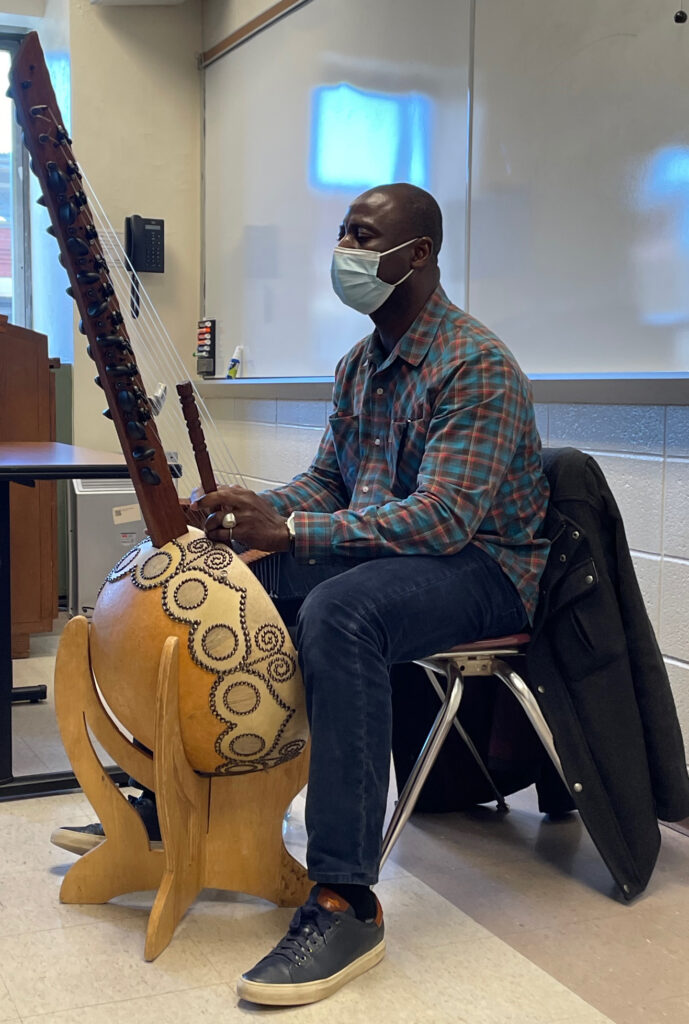
An Afro-Puerto Rican drummer visited the class and spoke about her challenges with learning and performing traditional Afro-Caribbean music, given that in her culture, women are not supposed to be performers.
“We do readings, we discuss things, but I think when they learn straight from somebody from the culture, it’s so much better,” Tallaj said. “I try to be very intentional about who I bring—maybe artists that challenge students’ traditional views, or norms or identities.”
As with all community engaged learning courses, students write essays about how they’ve been changed by the class—by learning to be a more engaged citizen, perhaps, or by losing preconceived notions.
With pandemic-related restrictions easing, Tallaj hopes to take students to Bronx venues to learn more about others’ musical cultures. “It has been very interesting to me to see how students really want to go into their communities,” she said.
Living Theology
In an honors theology course that compares Jewish, Christian, and Muslim scripture, students worked with the Queens-based relief arm of the Islamic Council of North America, volunteering with food distribution or other tasks, said the instructor, Kathryn Kueny, Ph.D., professor of theology.
The students also co-organized an April 26 event at the Lincoln Center campus centered on the iftar, or Muslims’ post-sunset meal that breaks their daily fast during the holy month of Ramadan, and the class hosted a Muslim chaplain and a community organizer as well.
In class discussions of scripture, Kueny said, “we’re trying to draw on some themes that connect with our community partners,” such as community displacement—what it feels like and how faith communities have responded to it. In the students’ essays, she said, “you could really see that they were tying things together.”
Teaching a community engaged learning course meets one of her longstanding interests as an educator.
“I’ve always been really intrigued with the idea of thinking about how students can see religion, or the study of religion, in a different way, or think about a lot of these theological topics in more lived, experiential ways,” she said. “What does it feel like to be really hungry and desperate, or what does it feel like to have someone help you in your most desperate times? We read about those things and we’re almost numb to them, I think.”
The students’ community-based work not only helps students appreciate these experiences but also provides a much-needed salve to the isolation that came with the pandemic, she said.
“We’ve all been online and Zooming and missing out on those human encounters,” she said. “So the opportunity to engage with local communities has really gotten people back out there and makes them feel more connected.”
To inquire about giving in support of the Center for Community Engaged Learning or another area of the University, please contact Michael Boyd, senior associate vice president for development and university relations, at 212-636-6525 or [email protected]. Learn more about Cura Personalis | For Every Fordham Student, our campaign to reinvest in every aspect of the Fordham student experience.
]]>On a recent day in early March, construction crews were kicking off the second phase of the campus center renewal by starting to demolish the former entrance to the McGinley Center, the student hub that opened in 1959. Meanwhile, nearby, in a new four-story addition to that same McGinley Center, students were congregating in the student lounge—catching up, shooting pool, typing on their computers—and soaking in the soothing ambience.
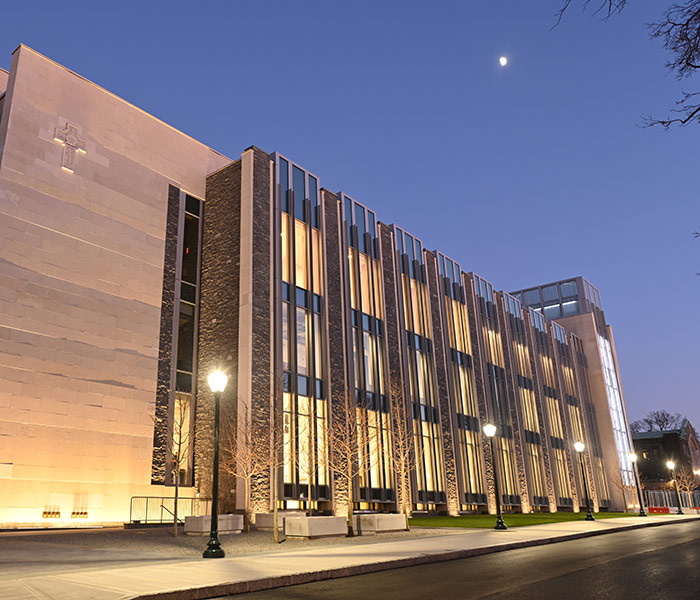
“It’s relaxing. I enjoy being here,” said Thomas Aiello, a junior who was getting some work done on his laptop. A student seated nearby, Kayla Bonitto, appreciated having the new gathering space after the physical isolation of taking virtual classes during the height of the pandemic. She and her friends had made plans to explore the new building together; on a recent night, students had gathered in the lounge for the State of the Union address and updates on the crisis in Ukraine. “It’s like a new sense of community,” she said.
That was the idea behind the campus center renewal, a keystone of the University’s $350 million fundraising campaign, Cura Personalis | For Every Fordham Student, which seeks to enhance all aspects of the student experience.
The new building addition will be combined with the Rose Hill Gym, Lombardi Center, and a renovated McGinley Center to form a larger complex that provides the entire University community with vastly greater space for offices, events, dining, fitness, and forming personal connections.
For some who have given in support of the project, it represents not just bricks and mortar but rather the continuous work of serving students and advancing the University from one era to the next.
Forging Ahead, Past the Pandemic
Kim B. Bepler, a Fordham trustee fellow and longtime University benefactor, recalled coming to campus for a lunch meeting during the first year of the pandemic, when the pivot to virtual learning had left the common areas of campus empty and quiet—except for the noise made by the builders.
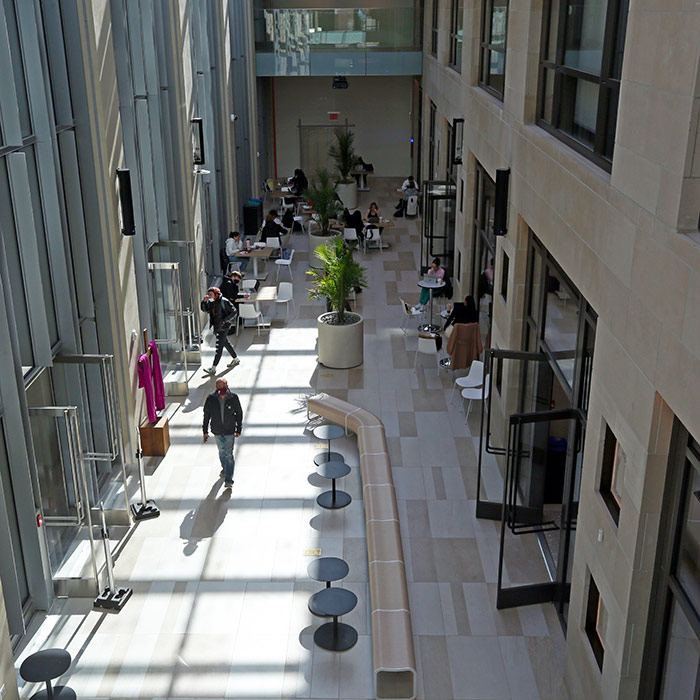
“It was rather poignant to be there when no one else was” and hear the project proceeding, she said. “At that moment, when we were all frightened, when we had no idea what was going on and when this was ever going to be over, that indicated to me that things would move on, life would continue somehow, some way,” she said.
She and her late husband, Steve Bepler, FCRH ’64, who passed away in 2016, have funded a wide array of needs at the University, including four endowed chairs in the STEM fields. It was appealing to support this project because the campus center will be named for Fordham’s president, Joseph M. McShane, S.J., and also because of its importance for fostering the informal exchange of ideas beyond the classroom, she said.
The project was important to Steve because of his own experience of student life at the University—“He loved his Fordham education,” she said.
“I just found that very encouraging and very heartwarming to be there during the pandemic and to listen to the sounds of construction and the sounds of the future,” she said.
‘Part of Being a Great University’
Trustee Emeritus Robert E. Campbell, GABELLI ’55, went to Fordham at a much different time, when the business school was housed in a surplus Army barracks building on the Rose Hill campus. “Many days, we would sit through class with our overcoats on,” he said. The McGinley Center wasn’t yet built, and because he was commuting from northern New Jersey, his mingling on campus was limited.
Even so, the social experience has stayed with him. “It put me in touch with so many new people,” he said. The Rose Hill campus “always was a place where wonderful people congregated.”
He went on to contribute to the physical transformation of the campus—as chair of the Board of Trustees from 1992 to 1998, he played a leadership role in the construction of the William D. Walsh Family Library, which opened in 1997. He and his wife, Joan M. Campbell, are generous University donors who were among those honored with the naming of the residence hall complex—comprising Campbell Hall and Salice and Conley Hall—that opened at Rose Hill in 2009.Now, they are giving in support of the campus center renovation and expansion.
“I don’t look at it as necessarily just a physical structure,” Campbell said. “It’s a home for people. People come to Fordham and leave their own homes [and]take up residence at a place. My feeling has always been that you would like to make that, physically, as supportive as possible.”
He noted that students’ experience of the new campus center could encourage them to give back to the University down the line.
“You always have to keep investing. It’s just part of being a great university, which Fordham is,” he said.
Communal Spaces
The new campus center offers state-of-the-art fitness equipment; glass walls and ceilings that allow for natural light; bigger and better spaces for the Career Center, Campus Ministry, and Center for Community Engaged Learning; new multipurpose rooms; and many other amenities.
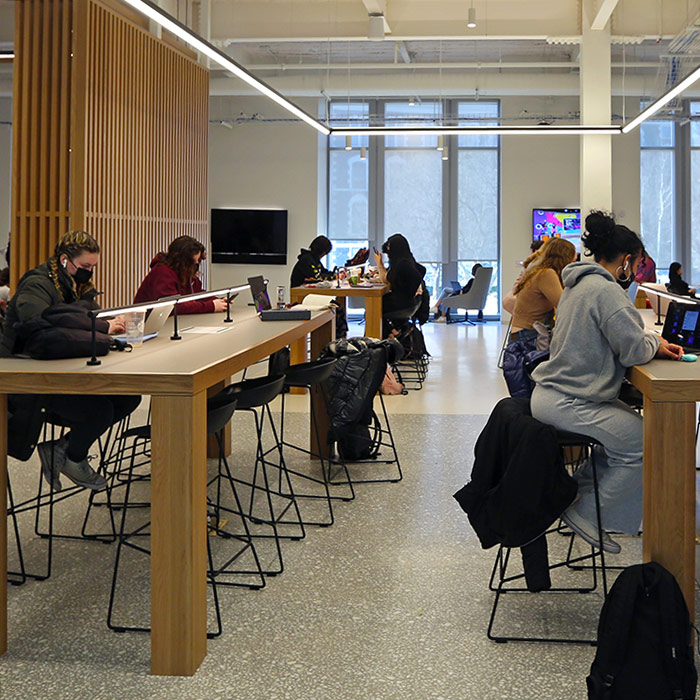
And more is yet to come—the phase-two demolition of the current McGinley Center entrance is clearing the way for an enclosed glass arcade from which students can access the Rose Hill Gym, the McGinley Center, the Lombardi Center, and the new building. That’s expected to be done by September 2023, said John Spaccarelli, director of facilities and special projects, who is overseeing the construction.
Phase three, to be done by the end of 2024, involves renovating the McGinley Center and reconfiguring some of its existing spaces, Spaccarelli said. He estimated that the entire campus center renewal is 35% to 40% complete.
In the student lounge, first-year student Jocelyn De Fex appreciated having the kind of inviting communal space that commuters like herself would otherwise have a hard time finding on campus. “If this didn’t exist, I would only be able to go to the library,” she said. She was hanging out and eating breakfast in the lounge with Kayla Bonitto, who appreciated the layout that makes the Career Center easier to find.
“When you get off the [second floor]elevator, it’s immediately right there,” said Bonitto, a junior.
A Place for Focusing
Nearby, Nick Chao, also a junior, said the lounge seemed to invite studying. “You kind of feel like when you come here, you can get work done,” he said. “I come here maybe a few times a week, maybe late at night, just to get some studying in.”
Conversation formed a gentle background hum. The 17-foot-high ceilings were treated with an acoustical spray that not only protects against fire but also dampens the sounds that would normally be bouncing around between the walls and the ceiling, Spaccarelli said.
Aiello, an organizer with the Herd, a student group supporting Fordham athletics, said the aesthetic appeal of the center will surely help with recruiting prospective students as well as student-athletes. The project shows Fordham’s commitment to updating its infrastructure, and “I think that’s huge for [the University],” he said.
To inquire about giving in support of the campus center renewal or another area of the University, please contact Michael Boyd, senior associate vice president for development and university relations, at 212-636-6525 or [email protected]. Learn more about Cura Personalis | For Every Fordham Student, our campaign to reinvest in every aspect of the Fordham student experience.
]]>
“This fund will directly give students opportunities to feed their souls and bodies with nourishment in the form of meals, conversations, and retreats,” said Carol Gibney, director of solidarity and leadership in Campus Ministry. “I’m thrilled for the students who will be the beneficiaries of Theresa’s generous donation.”
Mao, now 85, is a retired chemist, businesswoman, and philanthropist who grew up in Taiwan and moved to the U.S. when she was 18 years old. In 1964, she was hired by one of the world’s largest oil and gas companies, Exxon Mobil Corporation, then known as Esso Research, as the company’s first female chemist with a Ph.D. When she was 46 years old, her husband, Peter T.H. Mao, M.D., a pathologist, suddenly died from a heart attack. She became a single mother who raised their two daughters, then a junior at Rice University and a first-year student at Harvard University. In order to provide a living for herself and her family, she switched her career to investment in real estate, which included citrus farms, vineyards, and a fruit packing house. Both daughters followed in their father’s footsteps in medicine: The oldest is an ophthalmologist in Florida; the youngest is a pediatric infectious disease specialist in Massachusetts.
Mao was raised in a family of Presbyterians, including a grandfather and two uncles who served as ministers. But she became a devout Catholic as a teenager in Taiwan. One day, she encountered a Catholic priest on a long bus ride. Seven months later, she sought refuge in a mountainside church during a thunderstorm—coincidentally, the same priest’s church. The next summer, she studied under his wing and learned what it means to be Catholic. In August 1952, she was baptized by that same priest, John T.S. Mao, who would provide a scholarship for her to attend Our Lady of the Lake University in San Antonio, Texas. In 1962, she married Father Mao’s youngest brother, Peter T.H. Mao.
When she was a young woman in her 20s, she was accepted to teaching assistant programs at three schools in New York City—Columbia University, New York University, and Fordham. She said she was impressed by the reputation of the first two schools, but she chose Fordham because of its Catholic background; she wanted an education that would strengthen her own faith.
“I probably value my religion as a Catholic more than a person who was born Catholic,” Mao said earlier this year, “because I picked it.”
Mao loved her years at Fordham, but she was disappointed that there were no religious events or retreats for graduate students. Mao was also an international student who couldn’t afford to fly home to Taiwan during holiday breaks. Life on campus could feel isolating, she said.
“Undergraduates meet each other a lot more. Graduate students are different. They come in; they go. There’s so little time to meet each other,” she said.
Mao took matters into her own hands. One day after a late-night chemistry experiment, she suggested to her classmates that they eat dinner at a nearby Chinese restaurant together. That one dinner turned into bimonthly meals with up to 20 students. They piled into cars—sometimes seven students in one vehicle—and shared meals at local Chinese restaurants, where Mao introduced them to Cantonese-style roast duck and baos. Their special dinners expanded to include Italian restaurants on Arthur Avenue and trips to roller skating rinks and musicals in Manhattan.
“Everybody just loved to go. We started with a small group, and then later on, everybody wanted to join in. We got to know each other a lot better … Now I want to help [today’s graduate students] develop their relationships,” said Mao, who earned a master’s degree in chemistry in 1960 and a doctorate in physical chemistry in 1964.
This year, she established the Theresa Lim Mao Graduate Student Retreat Endowed Fund, which will support an annual retreat program and dinners for graduate students at Fordham who want to deepen their relationships with their classmates and their faith.
“Retreats are a way to literally retreat from everyday life and step aside from busy schedules, particularly for students,” said Gibney, who will help coordinate the inaugural events this spring. “They offer students an invitation to deepen their understanding of who and what feeds their spirit, their relationships with others and God, with our rich Ignatian history and spirituality as a compass and guide.”
Mao’s fund is part of a planned gift that designates Fordham as a beneficiary of her individual retirement account. She is beginning to add funding to her endowment fund annually, to support the initiative now. Mao said she wants students to pay it forward, the same way she has done throughout her life.
“All of us can contribute to society by doing something for other people. If we contribute something to society instead of just making money and serving ourselves, in a small way, we can make the people around us happier,” said Mao, who now lives in Florida near her oldest daughter. “If all of us can do a little bit of that, that would be really wonderful.”
]]>